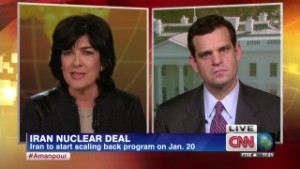Published on Jan 13, 2014
January 12, 2014 MSNBC News.....
White House Punishes More Firms Over Iran Sanctions
By DAVID E. SANGER and MICHAEL R. GORDON
Published: December 12, 2013
WASHINGTON
— Under pressure from Congress to demonstrate that it is not easing up
on sanctions on Iran’s oil sector or on its nuclear and missile
programs, the Obama administration on Thursday announced an expanded
list of companies and individuals that it said it would target to block
their trading activities around the world.
Among
the newly penalized companies is a Singapore-based firm called Mid Oil
Asia, which is accused of helping the National Iranian Tanker Company
make payments for services through money transfers that made no mention
of the vessels that were aided, or their Iranian ownership. Another
Singapore company, Singa Tankers, is accused of helping Iran make
“urgent payments.” The location of both companies is notable because
Singapore often prides itself on running a carefully regulated shipping
and banking system.
Five companies are
accused of helping Iran’s nuclear and missile program, including an
Iranian firm, the Eyvaz Technic Manufacturing Company, that the United
States said had procured some of the most sensitive and hard-to-build
components for Iran’s nuclear centrifuges. The centrifuges are the
machines that, spinning at supersonic speeds, enrich uranium; over the
years the United States has sought to undermine the effort with
sanctions, faulty parts and cyberattacks.
Another
firm is accused of helping Iran obtain components for its heavy-water
reactor facility, which officials fear will ultimately give Iran another
pathway to a bomb capability, using plutonium.
The
administration’s announcement of its enforcement actions appeared to be
timed to set the stage for a Senate Banking Committee hearing on the
Iran nuclear talks and the United States sanctions policy on Thursday
morning.
Wendy R. Sherman, the senior State
Department official who led the American delegation at the nuclear
talks with Iran, and David S. Cohen, the senior Treasury Department
official who oversees the enforcement of sanctions on Iran, testified to
the panel.
The aim of the interim
agreement that was reached last month in Geneva is to freeze much of
Iran’s nuclear program for six months so that international negotiators
can pursue a more comprehensive accord.
That
interim agreement, however, has not yet formally gone into effect. Ms.
Sherman said that the precise start date was being taken up in technical
talks, but that the agreement should start to take effect in the next
several weeks.
The interim agreement can
also be extended for an additional six months by mutual consent if
negotiators need more time to pursue a follow-on agreement.
.....Clock ticking on Iran talks, possible further U.S. sanctions
updated 4:39 PM EST, Mon January 13, 2014

STORY HIGHLIGHTS
- NEW: President Obama says "now is not the time for new sanctions"
- Iran to limit its nuclear program in exchange for sanctions relief starting January 20
- Talks will continue on a broader deal to prevent Iran from developing nuclear weapons
- A bipartisan proposal in Congress calls for imposing new conditional sanctions on Iran
Sunday's
announcement that a six-month interim agreement formally begins on
January 20 means that Iran must dismantle or freeze some of its nuclear
program and open it to more international inspections in return for
limited relief from crippling international sanctions.
Assuming
all goes as planned, further negotiations between Iran and the United
States, France, Russia, China, Great Britain and Germany will seek a
broader agreement intended to prevent Tehran from developing a nuclear
weapon.
Meanwhile,
pro-Israel members of Congress are seeking additional sanctions against
Iran that would take effect if the talks break down.
Israel
considers Iran's potential nuclear capability an existential threat,
and has made clear it would attack militarily if it believed Tehran
could develop such weapons of mass destruction.
The
question is whether the steps Iran is taking under the interim deal
will blunt or bolster the congressional push for more sanctions.
President
Barack Obama warns that approving new sanctions legislation now would
undermine the talks, and he has promised to veto such a measure if it
came to his desk.
"Now is not time for new sanctions," Obama told reporters on Monday.
He
warned the continuing negotiations with Iran would be "difficult" and
"challenging," adding that "ultimately this is how diplomacy should
work."
A bipartisan
proposal that would impose new U.S. sanctions -- but put off
implementing them to allow time for negotiations to continue -- has the
support of 59 Senators so far, a senior Senate aide told CNN last week.
According
to the aide, the informal count for the measure introduced by
Democratic Sen. Robert Menendez of New Jersey and Republican Sen. Mark
Kirk of Illinois surpasses 75 votes -- more than enough for the
Democratic-led Senate to override the promised presidential veto.
It
takes a two-thirds majority of both the House and Senate to approve a
law over a president's objection. The GOP-led House would have a much
easier time of reaching that threshold.
The
Obama administration argues the six-month interim deal includes
sufficient safeguards in the form of new compliance verification by the
U.N. nuclear energy watchdog -- the International Atomic Energy Agency
-- to make further sanctions unnecessary at this time.
 Iran's nuclear scale down begins Jan. 20
Iran's nuclear scale down begins Jan. 20 U.S. hails implementation of Iran deal
U.S. hails implementation of Iran deal Businesses benefit from Iran's nuclear accord
Businesses benefit from Iran's nuclear accord 








No comments:
Post a Comment
Hello and thank you for visiting my blog. Please share your thoughts and leave a comment :)